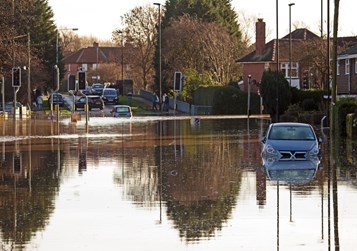Harry Steele is the RTPI’s Infrastructure Specialist
 While water makes up 71% of the earth, only 3% of the water found on earth is freshwater, and with the effects of climate change, the way we manage this vital resource is becoming increasingly important. Since 1993, the UN has held World Water Day on 22 March, helping to promote the importance of fresh water and advocating for the sustainable management of freshwater resources. With the increasing effects of climate change becoming clearer and more concerning, there is a real need to better understand how we can protect and manage this resource.
While water makes up 71% of the earth, only 3% of the water found on earth is freshwater, and with the effects of climate change, the way we manage this vital resource is becoming increasingly important. Since 1993, the UN has held World Water Day on 22 March, helping to promote the importance of fresh water and advocating for the sustainable management of freshwater resources. With the increasing effects of climate change becoming clearer and more concerning, there is a real need to better understand how we can protect and manage this resource.
For the planning sector the challenge of managing freshwater resources can range from combatting floods and droughts whilst also ensuring that water quality is high. Perhaps the most pertinent and visible challenge is combatting and mitigating the effects of flooding. Recent events such as Storm Eunice and Franklin have shown the dangers of flooding, with flood warnings causing hundreds in Yorkshire and Manchester to evacuate their homes and leaving 1.4 million people throughout the UK and Ireland without power in their homes.
The regularity and severity of these events has increased throughout the UK and Ireland, with the last two decades being punctuated with significant flood events. The causes of flooding can vary, from rivers bursting, to surface water and groundwater swelling alongside poor drainage, but in all of these causes there is a role for planning to play to mitigate the effects. Whether that be through the rewilding of rivers, creation of sustainable drainage systems or the installation of flood defences the planning sector can help equip communities with the sufficient systems and methods to minimize and mitigate the effects of flooding from the earliest stage.
While flooding may be the most prevalent issue for water and planning, the inverse challenge of mitigating droughts must not be overlooked either. Between 2016 and 2019 the UK experienced a prolonged period of dry conditions which had knock on effects on water pollution, fish kills, algal blooms and even 38 counts of wildfires in 2018. Similarly to floods, if the effects of climate change are to continue as projected, then the regularity and severity of drought events are going to increase and as a result the planning system must help to plan communities that are both resilient to droughts but also communities that can minimize the likelihood of droughts.
Through the planning sector and system we can help to futureproof communities, ensuring that they have a sustainable water supply, incorporating new reservoirs alongside more efficient water infrastructure. Whilst the planning system cannot change how much water we have to use, it can help to protect the water that communities do have and help them to make the most of it.
The water industry in England has been privatised for over 30 years, however the physical infrastructure in many places outdates the privatisation by a large margin. If we are to better plan for flooding, droughts and greater water management then there needs to be investment in the right infrastructure to ensure that a sustainable future can be delivered for all.
Aside from the physical effects of flooding, droughts and water infrastructure, the issue of nutrient neutrality is of paramount importance for water and planning throughout the UK and Ireland. In practice this refers to the nutrients, nitrogen and/or phosphorus, from surface water runoff and wastewater generated by developments being less than or equal to the nutrients generated by existing land use. Achieving nutrient neutrality is hinges on the use of onsite treatment of wastewater and surface water runoff or the increasing of nutrients through rewilding and the increasing of woodlands and wetlands.
The RTPI has previously called for Local Environment Improvement Plans (LEIP), which would develop a shared understanding of the environment including problems and opportunities related to water and planning. A LEIP would create a single shared strategy to improve the environment of an area, helping to collate data alongside local needs and expectations to deliver a holistic strategy to protect and enhance the local environment.
With the issue of combatting both flooding and droughts alone, it is clear that the UK faces a significant challenge in the coming years to deliver a sustainable future for water. A properly resourced, funded and skilled planning service certainly has the capability to deliver this future and tackle the various challenges of flooding, droughts, water infrastructure and water quality. However World Water Day is the perfect time to reflect on both the scale and importance of the challenge.
Later in the year I will be releasing a research report upon all elements of planning and water, from the issue around flooding and droughts that we have focused upon here to the issues of water efficiency and water infrastructure throughout the UK and Ireland. RTPI members can help with this by staying in touch with the project through roundtables later in the year or by helping respond to the upcoming DEFRA consultation for targets in England. If you would like to input into this project then please do not hesitate to contact me ([email protected]).


